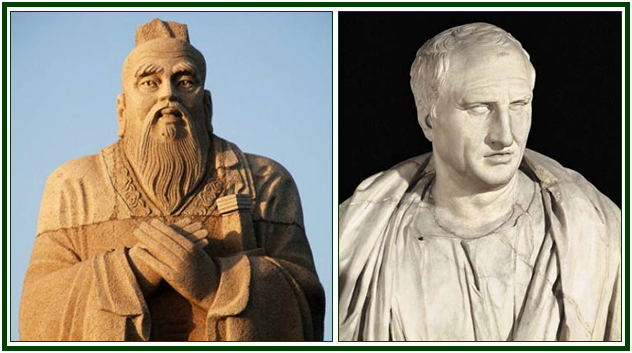
Or How Classical Authors Like Confucius
And Cicero Can Help the Theosophical Movement
Carlos Cardoso Aveline

A statue of Confucius in Junan, China, and Marcus Tullius Cicero
Readers of esoteric philosophy might consider studying Confucius and other classical authors.
Though not easy for the general public to have access to its details, the fact is well-documented that H. P. Blavatsky made a severe self-criticism, not long before her death in 1891.
Writing to the members of her esoteric school in 1889-1890, she said that she had underestimated human weakness in matters of Ethics. She had taught too much “Occultism” and given out sensitive information about the Path in a civilization whose ethical foundations were more fragile than she could anticipate.[1] She tried to correct that in her later writings.
If present generations of theosophists want to make use of that sour lesson learned by H.P.B. as she neared the end of her 19th century mission, their task may include putting theosophy on a firmer and more lasting ethical basis. Numbers and appearances do not matter: it is the Few who make the difference.
It has been said that Ethics is the art of sowing good karma. Each level of knowledge is inseparable from its corresponding degree of duty and ethics. No legitimate knowledge is divorced from moral duty. Information about life is worse than useless without a noble intention, as J-J. Rousseau brilliantly demonstrated in the 18th century. A natural task resulting from such a fact consists in looking around and seeing what are the best ethical resources and guidance available in the universal literature of the last 3,000 years.
Among the most valuable teachings on the topic one can see works like “On Duty”, by Cicero; “Protagoras” and “Sophist”, by Plato; the texts coming from Epictetus; the books by Seneca; “Meditations”, by Marcus Aurelius; and the works of Confucius. In the second part of 20th century, Erich Fromm made a great contribution. There are others.
The ethical question is a sensitive issue for the esoteric movement. Lack of ethics and discernment is related to the root-causes from which emerged phenomena like pseudo-theosophy, disloyalty towards the founders of the movement, adoption of false rituals, pursuit of UFOs and widespread fake clairvoyance.
In an article first published in December 1888, Helena Blavatsky wrote:
“… We (…) denounce (…) openly and (…) virulently the distortion of the original lines upon which the Theosophical Society was primarily built, and the gradual loosening and undermining of the original system by the sophistry of many of its highest officers.”
“We bear our Karma for our lack of humility during the early days of the Theosophical Society; for our favourite aphorism: ‘See, how these Christians love each other’ has now to be paraphrased daily, and almost hourly, into: ‘Behold, how our Theosophists love each other’.”
“And we tremble at the thought that, unless many of our ways and customs, in the Theosophical Society at large, are amended or done away with, [we] will one day have to expose many a blot on our own escutcheon – e.g., worship of Self, uncharitableness, and sacrificing to one’s personal vanity the welfare of other Theosophists – more ‘fiercely’ than it has ever denounced the various shams and abuses of power in state Churches and Modern Society.”
“Nevertheless, there are theosophists, who forgetting the beam in their own eye, seriously believe it their duty to denounce every mote they perceive in the eye of their neighbour.” [2]
Trouble did not start in the 20th century. The non-appearance of the announced third and fourth volumes of “The Secret Doctrine”, and the very date of HPB’s death – which took place earlier than generally expected – are perhaps linked to a perception by the “Powers that be” that the ethical foundations in Western Public and in the theosophical movement were not quite rock-solid in the late 19th century, and it was better therefore to let the “female disciple” have some rest, giving mankind time to absorb what had been taught already.
It is up to theosophists to make long-term, self-devised efforts, on the basis of the teachings received. One must rely on one’s own conscience and silent intuition, and learn from experience.
Theosophical or universal Ethics is among the greatest human needs. The theosophical movement must start by examining itself and its relation to legitimized fraud and saintly falsehood within its ranks. There are good signs already, and a conscious effort can be made to accelerate an ethical awakening and a liberation from delusions. One of the main lessons to present and future generations is in the axiom “first deserve, then desire”, which H.P.B. included in her text “Chelas and Lay Chelas”.
NOTES:
[1] See “Collected Writings”, H. P. Blavatsky, TPH, USA, Volume XII, pp. 581-590, especially pp. 583-584.
[2] From HPB’s article “Is Denunciation a Duty?”.
000
An initial version of the above article was published in “The Aquarian Theosophist”, October 2012 edition.
000
Read more:
* How to Strengthen One’s Will, by Helena Petrovna Blavatsky.
* The Notebook of Willpower, by Jean des Vignes Rouges.
000
In September 2016, after a careful analysis of the state of the esoteric movement worldwide, a group of students decided to form the Independent Lodge of Theosophists, whose priorities include the building of a better future in the different dimensions of life.
000